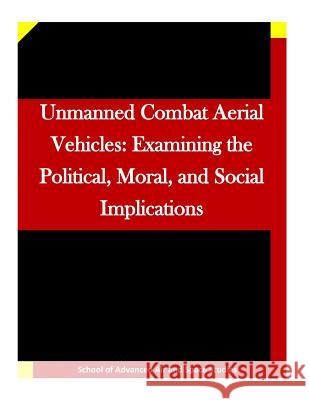Unmanned Combat Aerial Vehicles: Examining the Political, Moral, and Social Implications » książka
Unmanned Combat Aerial Vehicles: Examining the Political, Moral, and Social Implications
ISBN-13: 9781511645409 / Angielski / Miękka / 2015 / 68 str.
Unmanned Combat Aerial Vehicles: Examining the Political, Moral, and Social Implications
ISBN-13: 9781511645409 / Angielski / Miękka / 2015 / 68 str.
(netto: 49,90 VAT: 5%)
Najniższa cena z 30 dni: 51,96
ok. 16-18 dni roboczych
Bez gwarancji dostawy przed świętami
Darmowa dostawa!
There will likely be political, moral, and social implications of UCAV employment that strategists and military commanders will need to pay attention to as they craft strategies for future conflict. UCAVs are a very appealing option for the politician faced with use-of-force decisions due to reduced forward basing requirements and the possibility of zero friendly operator casualties. The flexibility of the weapon system offers the politician a seemingly high degree of control over the process of war. Together, these advantages may make a politician more inclined to use force first rather than last. In the moral realm, UCAVs are neither immoral nor illegal simply because risk to one of the combatants is removed. Additionally, notions of chivalry and fairness are not good standards by which to judge this technology. The social impact of widespread UCAV employment on the operator is an area of further concern. Remote-control war, however, does not change the underlying assumptions that have been the basis for the military ethos in the past. The final chapter highlights the dynamic between political, moral, and social issues as it addresses a range of possible unintended consequences resulting from extensive UCAV employment. Ultimately, the purpose of this thesis is to provide strategists greater clarity on the political, moral, and social issues surrounding UCAV employment. Doing so allows them to more effectively address, both objectively and subjectively, the implications of this new technology.
Zawartość książki może nie spełniać oczekiwań – reklamacje nie obejmują treści, która mogła nie być redakcyjnie ani merytorycznie opracowana.











